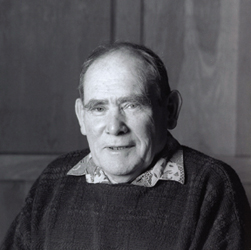
|
{
C O N T E N T S } Affiliated
Conferences Download Newsletter pdf |
|
Nobel Laureate to Deliver Keynote Speech at ISMB 2003
Sydney Brenner, one of three recipients of the 2002 Nobel Prize in medicine, will deliver a keynote speech at ISMB2003. Brenner, a distinguished professor at the Salk Institute for Biological Studies and founder of the Molecular Sciences Institute, was honored for his contributions toward discoveries about how genes regulate organ growth and the process of programmed cell death. Brenner showed that the tiny transparent worm C. elegans was useful for studying how cells specialize and organs develop. His work ``laid the foundation for this year's prize,'' the awards committee said. During his distinguished career, Brenner also demonstrated that a chemical could produce specific genetic mutations in the worm, allowing different mutations to be linked to specific effects on organ development. The work of Brenner and this year’s Nobel laureates in medicine has implications for understanding a range of diseases, including cancer, AIDS, strokes and neurodegenerative diseases. "Sydney Brenner has made remarkable contributions throughout his career to our understanding of biology and medicine,” said Richard Murphy, president and CEO of the Salk Institute for Biological Studies. “He was responsible for uncovering the basic principles of how DNA instructs cells to make proteins and he was the first to sequence the genome of an entire multi-cellular organism (the worm C. Elegans), work that set the stage for understanding the field of cell death, which is critical to our understanding of many diseases, including cancer and degenerative diseases of the brain. His work also provided the foundation for the subsequent sequencing of the human genome. Sydney is a true visionary and one of the most important biologists of our time. He is well deserving of this honor." In the early 1960s, Brenner established the existence of messenger RNA, or mRNA, which can be translated into proteins, and demonstrated that the nucleotide sequence of mRNA determines the order of amino acids in proteins. For these discoveries in 1971, Brenner received his first Lasker Award, sometimes referred to as “America’s Nobels,” in Basic Medical Research. He received a second Lasker Award in 2000. Among his other notable advances, Brenner – with Salk Institute Distinguished Professor Francis Crick—proposed that a single amino acid is coded by three nucleotides, a triplet, of RNA. Born in 1927 in Germiston, South Africa, Brenner was awarded degrees in medicine and science in 1947 from the University of Witwatersand in Johannesburg. He subsequently moved to England where, in 1954, he received a D.Phil. in chemistry from Oxford University. In 1957, Brenner joined the Medical Research Council in Cambridge, England. There, he became director of the Laboratory of Molecular Biology and the Molecular Genetics Unit. From 1981-1985, Brenner served as a non-resident fellow at the Salk Institute; from 1989-1991, he was a scholar-in-residence at the Scripps Research Institute. In 1996, Brenner became president and director of science at the Molecular Sciences Institute in Berkeley, Calif. Brenner has received numerous awards, including the Gairdner Foundation International Award, the Krebs Medal, the Croonian Medal, the Harvey Prize, the Waterford Bio-Medical Science Award, the Kyoto Prize, the King Faisal International Prize for Science, and the Bristol-Myers Squibb Award for Distinguished Achievement in the Neuroscience Research. He is a member of the Royal Society of London, is a foreign associate of the U.S. National Academy of Sciences, and is an adjunct professor of biology at the University of California, San Diego. |

